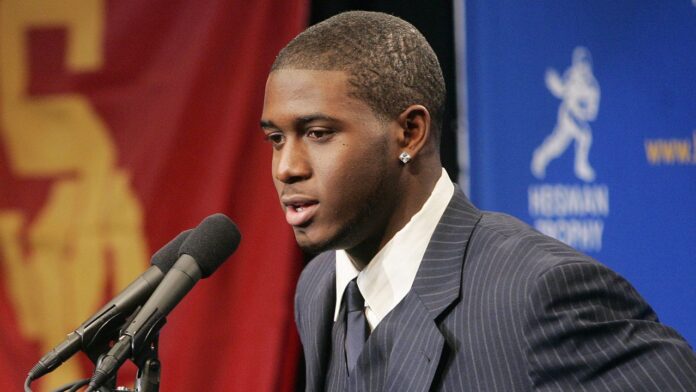In a show of support for a fellow Heisman Trophy winner, Johnny Manziel wrote on X Saturday he will not attend the annual trophy ceremony in December until Reggie Bush’s trophy is returned.
“Doesn’t sit right with my morals and values that he can’t be on that stage with us every year,” Manziel, who won the award in 2012, wrote. “Reggie IS the Heisman trophy.”
Other prominent figures in sports are also advocating for Bush. St. John’s head men’s basketball coach Rick Pitino wrote on X Saturday that Bush “should get his Heisman back” and called the trophy loss “one of the most hypocritical moves of all time” and an “injustice.”
Bush, whom the New Orleans Saints drafted second overall in the 2006 NFL draft, won the Heisman Trophy in 2005 after a dominant season at USC. Five years later, the running back returned the trophy to the Heisman Trophy Trust amid scandal. The NCAA accused Bush of violating amateurism rules by accepting “things of value” from would-be marketing agents. Those agents sought to pay Bush so he would hire them when he turned pro.
Manziel’s comments come at an inflection point for the NCAA, who Manziel urges to “do the RIGHT thing.” Last Friday, NCAA president Charlie Baker announced his organization would stop enforcing NIL-rules related to collectives. It comes as the NCAA faces far-reaching legal challenges to its amateurism model.
Bush losing college football’s most prestigious award and being painted as nefariously taking money under the table seems out-of-step in 2024. In recent years, U.S. Supreme Court justices, federal and state judges, lawmakers, regulators and commentators have blasted NCAA rules prohibiting college athletes from gaining compensation as exploitative and problematic. Bush is a more sympathetic figure now than he was in the late 2000s and early 2010s.
But that doesn’t mean Bush has been harmed in a way the law must remedy.
Last August Bush sued the NCAA in an Indiana court for defamation and false light. He alleges an NCAA spokesperson defamed him in 2021 when responding to a question by an ESPN reporter. The reporter asked if the NCAA would reconsider its sanctions on Bush given new NIL rules. In her response, the spokesperson didn’t mention Bush or anyone else by name. She instead said that although college athletes can receive NIL pay, “NCAA rules still do not permit pay-for-play type arrangements.”
Bush argues the spokesperson’s statement is defamatory because people generally understand “pay-for-play” to mean illicitly paying a recruit to attend a school. That’s not what happened with Bush. He ran afoul of rules related to an agent seeking to retain him as a client for when he joined the NFL. Bush cites statements by NCAA officials referring to boosters wrongfully paying recruits to attend a college. He maintains the NCAA lied about him in 2021 because regardless of any payments from a would-be NFL agent, he wasn’t paid-to-play at USC.
In a motion to dismiss filed last month, the NCAA flatly rejects Bush’s legal theory. It says the spokesperson’s statement was an accurate summation of rules and made no mention of Bush. Even if the statement could be construed as being about Bush, “it is still true and thus not defamatory,” the NCAA insists.
To that end, the NCAA argues Bush engages in “misdirection” by quoting the spokesperson as saying “pay-for-play” but omitting what she actually said—“pay-for-play type arrangements”—a broader and more inclusive term. The association also points out that NCAA rules prohibiting recruiting inducements use “inducements” not “pay-for-play.” Further, the NCAA highlights how although Bush says the NCAA’s investigation was flawed, he has “never” contested “the substance of what the [Committee on Infractions] found—namely that he violated NCAA rules by receiving benefits precluded by those rules.”
Bush v. NCAA is occurring at a pivotal time for Baker.
From a legal perspective, the NCAA’s defenses are logical and persuasive. Defamation cases are difficult to win, especially for public figures, and the NCAA has offered several reasons why the spokesperson’s statement was likely not defamatory. While Bush could prevail, remember his case is not about losing the Heisman Trophy in 2010—it’s about interpretation of an NCAA policy statement made in 2021.
But from a social perspective, the NCAA defending against a popular former player and now a national college football analyst doesn’t help the association’s image at a time when it needs help. In the eyes of many college football fans, Bush is one of the greatest players of all time who was robbed of the Heisman Trophy because of unjust NCAA rules. Even though his lawsuit isn’t actually about the trophy, it is connected to the topic.
Perhaps the NCAA and Bush will reach a settlement wherein the NCAA doesn’t pay him and doesn’t admit to any errors, but announces it is reinstating Bush’s status for 2005. The trust has said it would return the trophy to Bush with the NCAA’s blessing.
Bush would win in that kind of deal and Baker would probably win even more.

